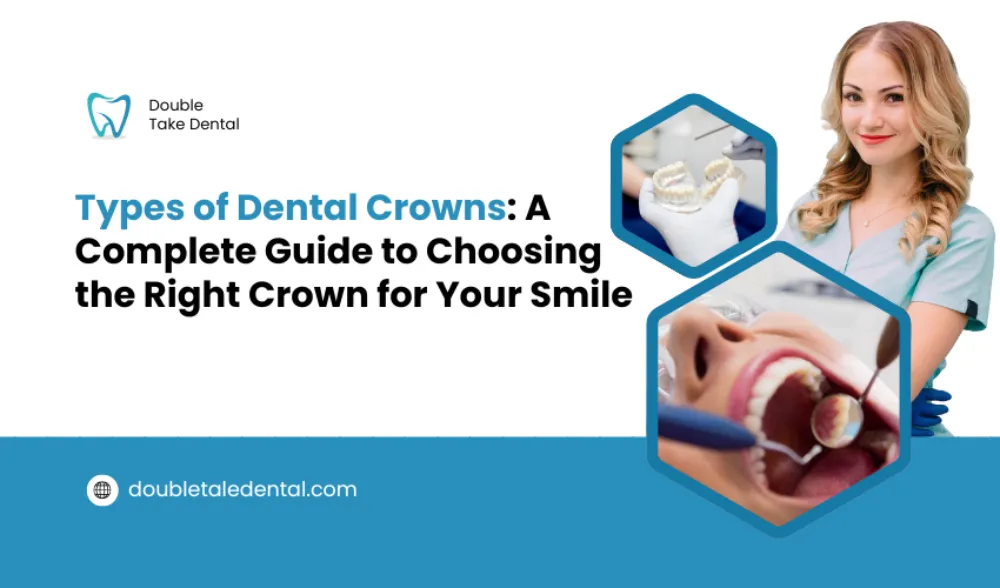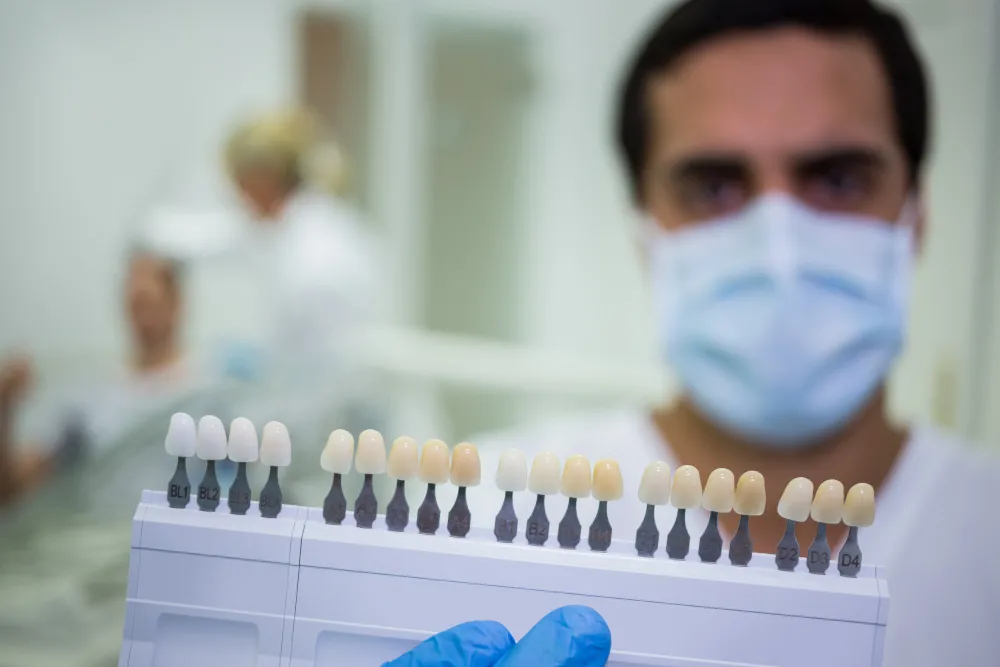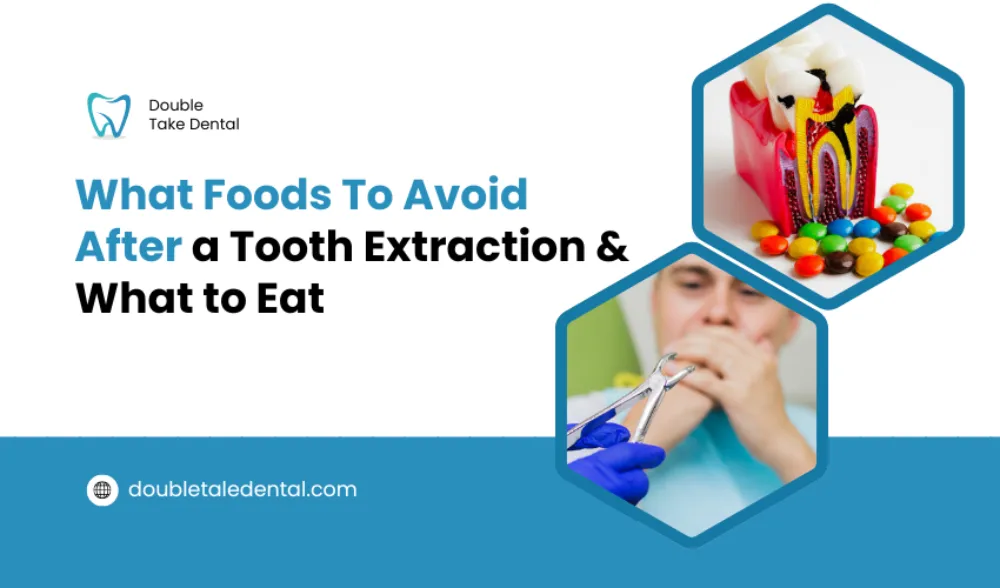Types of Dental Crowns: A Complete Guide to Choosing the Right Crown for Your Smile

Are you looking for a solution to restore the appearance and function of your damaged teeth? There are various treatments, including dental fillings, implants, and dental crowns, for all your dental problems.
Dental crowns are for those who have an intermediate level of tooth damage that cannot be treated with a filling, but also do not need a complete implant. They provide a complete covering for damaged teeth and offer a better look and functionality.
But how can you choose the best types of crowns for your dental problem? Let’s have a complete discussion about the different types of dental crowns and determine which type is suitable for your dental problem.
What Are Crowned Teeth?

Crowned teeth refer to natural teeth that are covered by a dental cap, commonly referred to as a crown. These crowns are customized restorations designed to protect a tooth that has become weak, decayed, cracked due to accident or any other mishap.
For people with cavities, a dental crown can help by covering the damaged area. This keeps food and other particles from getting trapped inside, which helps prevent infections.
Its other benefits include:
- Strengthens a tooth after a root canal
- Restores a broken or severely worn tooth
- Covers a dental implant
- Holds a dental bridge in place
- Improves the appearance of discolored or uneven teeth
The 7 Most Common Types of Dental Crowns
The seven most common types of dental crowns differ on the basis of their materials and their uses. Here are the most common types and their benefits to help you determine which one is best for you.
1. Porcelain Crowns (All-Ceramic Crowns)
Porcelain crowns offer a similar appearance to natural teeth and are ideal for those who want to restore their aesthetics. These crowns do not contain any metal composition which makes them suitable for individuals with metal allergies. However, porcelain ceramic crowns are not as strong as metal crowns, as they can be damaged if used to chew hard things and exposed to high pressure.
Benefits
- Natural appearance
- Metal-free and biocompatible
- Suitable for front teeth
2. Porcelain-Fused-to-Metal (PFM) Crowns
PFM crowns combine the strength of metal with the beauty of porcelain. They have a metal core for durability and a tooth-colored exterior for better aesthetics. Porcelain-fused-to-gold crown is another variation that uses a gold alloy for added resilience.
Benefits
- Durable and aesthetically pleasing
- Suitable for front and back teeth
- Cost-effective mid-range option
3. Metal Crowns (Gold, Alloy, Base-Metal)
Metal crowns, including gold and base-metal alloys, are the strongest option. These tooth crown types resist wear, which makes them perfect for molars that endure the most pressure. However, they are not good for front teeth as they have a metallic appearance.
Benefits
- Extremely durable
- Require minimal enamel removal
- Long-lasting
4. Zirconia Crowns
Zirconia crowns are made from zirconium dioxide, a high-strength ceramic. These different crowns for teeth combine toughness with a clean, tooth-colored look.
Benefits
- Fracture-resistant
- Biocompatible
- Improved aesthetics over traditional metal crowns
5. E-Max Crowns (Lithium Disilicate)
E-Max crowns are a modern all-ceramic solution. Made from lithium disilicate, they are both lightweight and strong, ideal for front and back teeth. However, they are more expensive than other types of crowns.
Benefits
- Highly aesthetic and natural-looking
- Durable despite thin structure
- Versatile for many dental scenarios
6. Composite Resin Crowns
Composite resin crowns are made from a tooth-colored plastic and glass mixture. These are affordable and suitable for short-term solutions. However, they are not durable and are prone to chipping and staining easily.
Benefits
- Cost-effective
- Natural appearance
7. Temporary Crowns (Including Stainless Steel)
Temporary crowns, including pre-fabricated stainless steel crowns, are used to protect your tooth while a permanent crown is being made.
Benefits
- Quick and effective protection
- Commonly used for children or emergencies
Comparison of the Types of Dental Crowns and Cost Factors

When choosing the right type of crowns for teeth, cost is a considerable factor to think about. The cost of the dental crown depends on different factors, including the type of crown, material, doctor experience, location, and insurance coverage. Here is a comparison of the costs of different types of crowns for teeth that will help you choose the best type according to your budget.
| Crown Type | Average Cost (Per Tooth) |
| Porcelain | $800 – $3,000 |
| Porcelain-Fused-to-Metal | $500 – $1,500 |
| Metal (Gold, Alloy) | $600 – $2,500 |
| Zirconia | $1,000 – $2,500 |
| Composite Resin | $300 – $1,000 |
How to Choose the Right Crown for Your Tooth
Before choosing the right type of dental crowns for you, you must consider the following factors. These will help you choose the right one according to your needs.
1. Tooth type
Some teeth experience more pressure than others. For example, molars are exposed to more chewing activities than the front teeth. For those teeth, the strength of the crowns matters more than the aesthetics. Therefore, metal crowns are recommended in these cases, as they offer strength without compromising your appearance.
2. Cost
Another factor to consider before choosing your crown is the cost. Porcelain and zirconia crowns are more expensive as they offer aesthetics and strength as compared to other options. However, Resin and PFM crowns provide good function at lower costs.
3. Aesthetics
If you want a crown for your front teeth, porcelain is the best option, as it offers a natural look for your smile.
4. Allergies
Besides look, strength, and cost, there is another factor that must be considered: allergy. Some people have metal allergies. So, consult your dentist before choosing the right option.
Taking Care of Your Dental Crown for Long-Term Durability
To help your crown last longer and avoid problems, follow these simple steps:
- Brush your teeth twice a day with fluoride toothpaste.
- Floss gently around your crown.
- Avoid chewing ice, hard candy, or sticky foods.
- If you grind your teeth, consider using a night guard.
- Make sure to visit your dentist regularly.
Final Thoughts
To wrap it up, choosing a dental crown is a reliable way to enhance your smile and protect your tooth’s structure. However, it is important to choose the right type of crown for the best outcomes. Various factors are considered while choosing the right type of crown for your dental needs. These factors include the aesthetics, strength, type of tooth, affordability, and allergies to any type of material.
If you are looking for the best place for your dental crown treatment, there is no better place than Double Take Dental. Their years of experience and skilled experts offer the best treatment and friendly consultation to choose the most suitable option for your teeth.
Recent Posts

What Foods To Avoid After a Tooth Extraction & What to Eat

Types of Dental Crowns: A Complete Guide to Choosing the Right Crown for Your Smile

What to Eat After Root Canal: Recovery Tips & What to Avoid

